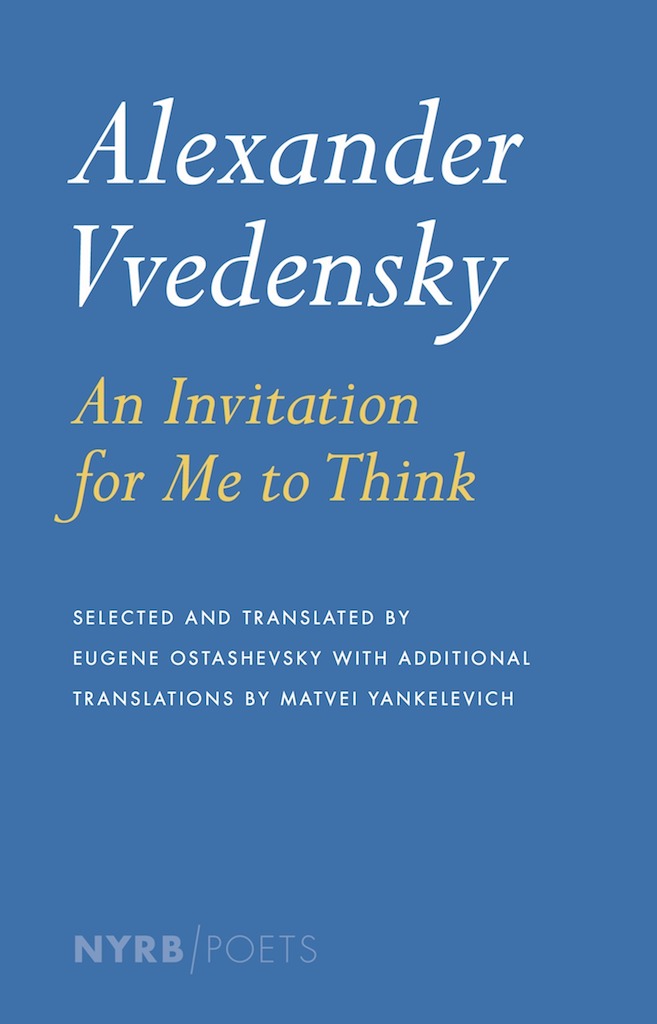That Alexander Vvedensky’s name is known among Russian readers today—even if in a narrow circle—and that he has, moreover, been translated into English is nothing short of a minor miracle. After all, this “minor poet” perished in 1941 at the age of thirty-seven having published a number of children’s books and just a few early poems. What appears in Eugene Ostashevsky’s selection of Vvedensky’s work, An Invitation for Me To Think (NYRB Poets), was written in a lazy but even hand, circulated among friends, and read at private gatherings in the 1930s. The manuscripts that have survived were kept by his friend, the writer Daniil Kharms. Not long after Kharms’s arrest in August 1941, his apartment building sustained a bomb strike during the Siege of Leningrad. The philosopher Iakov Druskin, aided by Kharms’s partner Marina Malich, gathered all the manuscripts left in the room into a suitcase which he took into evacuation and, after the war, back to Leningrad. Not knowing whether his friends were alive somewhere, Druskin kept the suitcase closed for many years. In the 1960s, some young scholars who’d heard legends of the OBERIU poets (Kharms and Vvedensky’s 1920s avant-garde group) came to inquire about the salvaged manuscripts and to hear their stories. The poems began to circulate in samizdat (underground publications, passed hand-to-hand), and then migrated abroad, bound for Western publications. Kharms was officially published in the USSR during glasnost (1980s), and Vvedensky’s two slim volumes appeared only after the Soviet Union collapsed, a half-century after his death.
Vvedensky’s poems exist, now perhaps more than ever. He never prepared them for publication, never dialoged with an editor, never saw proofs or made corrections. We don’t know how much of his writing is final drafts and how much of it was lost; some (including a novel) has definitively vanished. Yet, we’re confident this poet lived and wrote these poems, more or less. The instability of this body of work—(re-)constructed by scholars, editors, publishers, and translators—is both context and subtext for the way it makes meaning in its afterlives: in samizdat, in print, and in translation.
Skirting oblivion, impossibly present, Vvedensky now even exists in English where he rubs shoulders with contemporaries he never knew, echoing the metaphysical side of Laura Riding, the phenomenological bent of Gertrude Stein, and the grammatical play and befuddling repetition of both. Repetition is one of the most important (un-/anti-)rhetorical instruments in both Stein’s and Riding’s interrogation of language—of its very ability to mean. Vvedensky’s similar inquiry—in his own words, a critique of reason “more drastic” than Kant’s—is woven through poems that dismantle mimesis and push against predetermined linguistic connections. Vvedensky questions whether “a house, a cabin, and a tower are all connected and unified under the concept of building” and wonders whether “a shoulder should be connected with the number four.”
In this way, seeking to escape reason into “non-understanding,” the poet is always on the verge of losing authority, losing control, and authorship itself. Breaking with unity and individuality, the narrator of Vvedensky’s poem is not an “I”—not in the way of Wordsworth’s “I had a world about me—’twas my own, / I made it; for it only lived to me.” Rather, it is an eye looking out a window or staring out to sea, outward rather than inward—a self bordering an unbecoming, another self, or oblivion. He reinvents lyric voice as simultaneously individual and multi-vocal, coherent yet non-linear, shimmering in a language that has broken.
The English echoes—Riding, Stein, and others—that I can’t help (over)hearing will determine, in part, the angle of refraction through which you read the poem presented here. It was originally untitled; but his friends called it “Rug/Hydrangea.” It narrates the poet’s desire to become something (anything!) other than what he is. The repetition of whole lines and even whole passages—at times with the slightest variation, akin to a skipping record—dramatizes the return of the poet to the prison of the “I.” In one repeated quatrain, the narrator desires to be an eagle which itself imagines a man observing the land over which that eagle flies. The poet’s desire, therefore, is to be outside his body, above, seeing below the impersonal figure of the poet himself.
These repetitions recur in irregular, surprising patterns, remembering the song-roots of lyric, reminding us of their construction, their made-ness. It is as if, while lulling us with repetition, Vvedensky also cautions us not to mistake the poems for an unfettered form of expression. The refrains enact a process of forgetting and remembering, involving us in the poet’s circling process: moving away from and returning to self. The rug and the hydrangea are mundane objects, but they are of equal weight with the romantic image of the eagle, with abstract concepts like “uncertainty,” and with the final image of fire—a fire which is freed by the poem’s circling, wavering movements from its cliché symbolism, rid of metaphoric meaning, become strange, object-like, unknowable.
Vvedensky’s “Rug/Hydrangea” enacts an inability to become one with the things of the natural and human-made world. One could call it a melancholy reflection on the failure of the Romantic theory. Though he would like to be fire, it is mortality, finiteness, which makes Vvedensky doubtful of the creative powers of the poet—because “the worm crawls along behind us all.” Several of his writings present a narration from death (of death occurring, or a recounting of one’s own death) and death haunts this poem as well: the recurring epithet “the pebble of death” is an awkward memento mori, the spatial equivalent of an instant. The self to which Vvedensky’s poem continually returns undergoes, as does the poem, a kind of circling in dissolution. Identity burns down over the course of the poem. Memory dissipates, even the memory of oneself. Vvedensky’s “I” dissolves in a plural sea of a monotonous “us all.”
So-called translation problems abound here—where do they not? It is not possible—and also pointless—to “represent” in English each aspect of the poem, its rhyme scheme, its particular (Russian) sound and its (equally important) look. But a translation is not so much a representation as it is an interpretation. Though many adherents to notions of equivalence and fidelity—those who mourn translation’s “impossibility” and its “loss” or celebrate the very same impossibility, countering “loss” with “gain”—will try to convince you otherwise, translation’s task is, at its root, not to represent (nor “carry over”) anything at all. Rather, its function is (simply?) to interpret and enact.
Interpretation in this case has to do as much with the author’s historical context and (contextually-bound) poetics as it does with the gist of a phrase, a line, or any semantic or aesthetic unit. The tricky thing is to enact the poem within the scope of the interpretation. It is this tension between interpretation (contextual meaning) and performance (the gesture, the gist) that constitutes a translation. The difference of language merely establishes non-equivalence at the outset—translation is not, in the end, about the better choice of word. Of course, one has to choose, but it is the constraint created by the nexus interpret/enact that determines the scope of possible choices; any positions (political, aesthetic) the translation occupies begin in this determination of boundaries for the work.
When Vvedensky’s narrator “picks up the word wardrobe,” the reader may surmise that, though the object it signifies is recognizable, the word must be quite different in the original. Vvedesnky’s word has “tips of letters” that make it easy to grab hold of, despite the unwieldy nature of the object to which it refers. Furthermore, this word is the “thick dough of substance.” Indeed, the Russian word looks like this: шкаф (pronounced shkaf)—it’s easy to grab by the letters; it’s boxy, turned on its side it would look quite like an armoire, a one-syllable package, a container. It has a sound and shape which can’t be translated.
The English word wardrobe is not as short or boxy, but it is clunky to say, especially next to the word word (also quite different-sounding from Russian слово [slóvo]). Pronouncing ward- following word brings the reader to a halt, enacting the abruptness of the Russian monosyllable. The mouth chews on the shifting vowels in “word wardrobe,” producing the “doughy substance” of language. A real-life wardrobe may be placed by movers, but not grasped by the tips of its letters, yet Vvedensky’s narrator can quite easily put the word in its place—where words go: on the page, in the line above the one where the placing happens. In fact, the word has already been placed when the action is described, a linguistic time-loop, a disorientation, a making-strange that provokes us to experience the materiality of letters, words, language, tripping us up with its substance. We are in language; we can’t get out.




